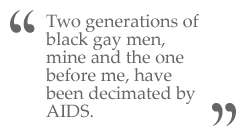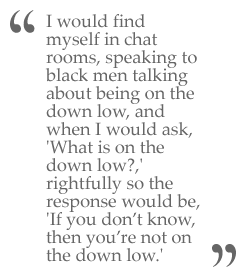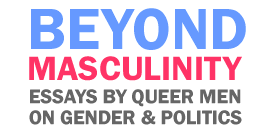|
 I give this rough and ready sampling to demonstrate that
there were things—some good, some bad, some
indifferent—happening at the end of the long century and
the beginning of the new millennium. Black folk, we were
as always, in our given cultural, national state of
being, in the field of vision, as it were, still
operating in the visual poles of endangerment and
entertainment. What is of interest to me is that in this
quick summary, we see, particularly in the late 80s and
early 90s, a visual cultural presence of black gay men
that arguably does not exist anymore. Part of the reason
for this, as I mentioned earlier, is that two
generations of black gay men, mine and the one before
me, have been decimated by AIDS. Another reason may be
that in the political climate of the gay and lesbian
movement, with its heterosexualization of homosexuality
in domesticity, domestic partnership, the language and
imagery of marriage, family and equality—black gay men
cannot be representative. By this I mean that when we
think of the visual rhetoric of things like gay
marriage, gay families and partnerships, the legacies of
the endangered black man, the always already
dysfunctional black family, these things disallow the
articulation of gay black men, coupled or not, as the
gay and lesbian neo-liberal norm. I give this rough and ready sampling to demonstrate that
there were things—some good, some bad, some
indifferent—happening at the end of the long century and
the beginning of the new millennium. Black folk, we were
as always, in our given cultural, national state of
being, in the field of vision, as it were, still
operating in the visual poles of endangerment and
entertainment. What is of interest to me is that in this
quick summary, we see, particularly in the late 80s and
early 90s, a visual cultural presence of black gay men
that arguably does not exist anymore. Part of the reason
for this, as I mentioned earlier, is that two
generations of black gay men, mine and the one before
me, have been decimated by AIDS. Another reason may be
that in the political climate of the gay and lesbian
movement, with its heterosexualization of homosexuality
in domesticity, domestic partnership, the language and
imagery of marriage, family and equality—black gay men
cannot be representative. By this I mean that when we
think of the visual rhetoric of things like gay
marriage, gay families and partnerships, the legacies of
the endangered black man, the always already
dysfunctional black family, these things disallow the
articulation of gay black men, coupled or not, as the
gay and lesbian neo-liberal norm.
Another reason for this decrease in visual presence may
have to do with black men’s entrée into the men’s
movement in the 90s, most representative in the Million
Man March. Both the political and visual rhetoric of the
march were straight (though arguably not intentionally
or exclusively straight), but inevitably in the
religiosity and spirituality of the Million Man March,
men’s movements, etc., again, the black gay male as
image is disallowed, unable to signify within the
political agenda of “unity, atonement and brotherhood.”
And the religiosity of black folk, perhaps in response
to the AIDS crisis, perhaps in the recuperation of black
masculinity as family responsibility, has no place for
black gay men like me. It is in this miasma of presence,
absence, and permission that the communitarian, cultural
production of the “in the life” identity is lost and the
down low rises.
 In August of 2003, I sat in my kitchen reading my email,
sifting through any number of forwarded emails
containing this exposé. I did not read the article for a
number of days. I was familiar with the “down low,”
with being on the down low, this identity of discretion,
privacy, and secrecy, as is often self-described. I
remember it first came to my attention with internet and
chat rooms in the mid-90s. I would find myself in chat
rooms, speaking to black men talking about being on the
down low, and when I would ask, “What is ‘on the down
low,’” rightfully so the response would be, “If you
don’t know, then you’re not on the down low.” I,
therefore, had no involvement with it, which is not to
say that I have no involvement with black men who did
not identify as gay or that I was always willing to be a
black man that identified as gay. However, I had no
interest in reading this article because I had been out
since I was twenty, and very simply, at forty, I really
did not have the time or energy to deal with it. In August of 2003, I sat in my kitchen reading my email,
sifting through any number of forwarded emails
containing this exposé. I did not read the article for a
number of days. I was familiar with the “down low,”
with being on the down low, this identity of discretion,
privacy, and secrecy, as is often self-described. I
remember it first came to my attention with internet and
chat rooms in the mid-90s. I would find myself in chat
rooms, speaking to black men talking about being on the
down low, and when I would ask, “What is ‘on the down
low,’” rightfully so the response would be, “If you
don’t know, then you’re not on the down low.” I,
therefore, had no involvement with it, which is not to
say that I have no involvement with black men who did
not identify as gay or that I was always willing to be a
black man that identified as gay. However, I had no
interest in reading this article because I had been out
since I was twenty, and very simply, at forty, I really
did not have the time or energy to deal with it.
But then my mother asked me about it. And she asked me
about it because she read it as being about gay men (and
also because the article begins with the discussion of
men on the “down low” living in Cleveland, and I had
just moved to Ohio). So I read it. And I followed it on
the news. I watched J.L. King, the author of the
bestselling exposé On the down low: A journey into
the lives of “straight” black men who sleep with men,
watched him on Oprah and CNN and became
increasingly infuriated by the willful participation,
willful life and living of these black men in the
discursive (and at this point typical, if not
traditional) space of the pathological. Gone was the
passionate, political, progressive poetry of black gay
men and the black gay renaissance; instead we have the
language of ethnography in an article like “Double lives
on the down low” or the contradictory, often times
confusing, faux jeremiad, faux journey of self
discovery, return and redemption found in J. L. King,
saying things like:
DL men cannot and will not be associated with anything
that would raise questions about his [sic]
sexuality. They will not say they are gay, because those
three little letters evoke so much fear. Those three
letters have them afraid of being ostracized by their
community, by their church, by their family. If they
tell the truth and say they’re gay or bisexual, they
will be called a ‘fag.’ That’s the worst word you can
call a black man. When a man is called a fag, it hurts.
It basically strips away his manhood (21-22).
King is disingenuous at best. What is basically received
from this description is an identity of denial,
admittedly, but also one of victimicity, deliberate
victimicity, and intractable pathology. Furthermore,
King’s DL is positioned quite violently in opposition to
other men, other black men who may reveal them or, worse
yet, who may identify themselves as gay or queer or same
gender loving or bisexual or simply sexual freewheeling
without the internalized burdens of race, without the
pathology of blackness and with the courage, fortitude
and integrity of self awareness and self definition and
political intention. And herein lies the problem: the
opposition laid out between black gay men and men on the
DL is one that has to be violently maintained because it
is a question of manhood, of black manhood, of
masculinity and the maintenance of that masculinity... (continue reading)
|




9 COMMENTS ON THIS ESSAY:
I am very curious about the life on the downlow. I am living with a man, a gay black man, who is very secretive at times about his sexuality, yet is very open at other times. In conversation with him, he shares there are so many reasons why black men don't share their homosexuality. I am very open as a white man, but find it utterly fascinating, this culture of the downlow. I live in Menifee, just a few miles from Riverside. Is there a class you offer, or have an suggestions as to how I can be more educated on this culture?
I think that so many people are interested with this phenomenon is that they feel that it is helping to erode the ever declining hope of family values in America. As a gay man who has had the fortunate and unfortunate luck of being involved in these potentially toxic relationships is that their primary focus is on sex, secondly is demeaning in so many different ways. The guy(tri-sexual) will do or say just about anything to get you to give him what he wants and most of the time won't take the time to protect you or himself because if he did that in his mind he would be admitting that he was doing something wrong. I would love anyone to contact me about their views or opinions about this subject as well.
Thanks in advance
There are plenty of black men that are openly gay. I think it is against God, but, atleast they come out and be who they are. It is extremely evil to be having all of this unprotected sex and bring sickness home to unsuspecting people. There is no reason for it. Just be who you are and if you want to change pray. But be who you are and stop all of this decieving.
The period the author is talking about (1986-2003) is a period where the black SGL (same gender loving) community came out more than ever. I do agree that both black and white audiences have glamorized and hyped the DL phenomenom, but the reality and the hype are two different things.
I provide the following as examples. From 1986 to 2003 we see the establishment and flourishing of black gay prides in several large US cities-- especially Atlanta, DC, New York, Detroit, and Los Angeles. These prides are separate from the mainstream (white) prides that have long excluded participation by blacks. Second, magazines such as Clik, Ballroom, and others flourised and served a much needed market. Third, the start and growth of mainstream, commerical black gay fiction. Authors such as James Earl Hardy, E. Lynn Harris, Christoper Davis, L.M. Ross, Frederick Smith, and others have found significant success. It should be noted that the vast majority of the authors do not deal in "DL" mythology. Fourth, the rise of a group of black gay spokespersons such as Keith Boykin and Phil Wilson, who continue to provide much needed commentary on SGL issues. Fifth, the rise of SGL blogs such as Rod 2.0, Living Out Loud, Frank Roberts and others, who are able to inform their audiences about issues important to SGL communities. After this period we have seen "Noah's Arc" light up the big and small screen, and many other accomplishments.
I agree that the DL discussion is frustrating in our community. But I think the DL discussion hinges on two points that people would rather not discuss.
1) The need for people (particularly white gays) to continue to hold the belief that black people are "more homophobic" than white people. The DL arc fits nicely into that story-- that there are pathologies in the black community that lead to further pathologies (lies and self-deception) that lead to even worse pathologies (HIV). Sadly, this stereotype is openly supported by many black gay men (note not SGL men) who desire access to white gay men and white gay spaces. The end result is a media mantra that villifies SGL men in particular, and holds all black men suspect.
2) That there is no empirical evidence that SGL men are the cause behind increasing HIV rates of black women. Indeed, the CDC's own data shows that black SGL men are more likely to practice safer sex than their white counterparts. Also, we have not discssed the degree to which the DL is a function of the high incarceration rate amon African Americans, where in prison they are exposed to both homosexual sex and IV drug use. Rather than looking at black culture, we may want to discuss some larger institutions at play.
I just wanted to respond to two of the most recent comments posted. Brigette, I am not sure what you are talking about. The call to prayer and be yourself is somewhat insulting given the tenor and subject matter of the essay. With regard to the posting on December 24, 2008, the comments are more interesting and engaging of the subject matter. I agree with the summation of the cause of the DL popular discourse, and I note in the essay that it is part of the ongoing pathologizing of black folk or representing and discussing black folk as pathology. I didn't mention the community and political and cultural events and happening that you mentioned (the prides, Noah's Arc, E. Lynn Harris, etc.) because I was pitting the DL against the notion of In the Life from the late 80s and early 90s (and this essay is part of a larger project that will include discussions of the things that you mentioned). I would not, however, consider someone on the DL to be same gender loving (SGL) because it is, indeed, the idea of the same gender loving from which someone on the DL seeks to remove himself. (And no, I am not going to fall into the trap that someone is on the DL because of their homophobic black family; in fact, I would argue, as I have elsewhere, that there is nothing especially black about being on the DL.) Thank you for your comments. Perhaps, we can speak more.
kmh
(Editor's Note: This appears to be a comment translated rather poorly from a user in Belgium. I'm leaving it as is). There are many factors in America to use. Ifwe shall the ...traditional values and racial. Trends such as men of color need to macho. Due to peer pressure not only Blacks the Gay community as. Whole in America for example when transgender call themselves. Gay it makes non transgender offended why? The standards see we may disagree allow me to make. My statements this the freedom of America. The desire to be individualistic in America is problem. And gender is the cause... I am referring to. Attitude of yes woman I shall be specific. Why I ask for response as openly Gay male. Whom resides in Europe were I have freedom
to enjoy. My life but opposite America...status of race. I know many non men of color while living in America. They always was accepted why there mannerism was. Accepted so I do not lose the reader. This important when Black men are successful and single. Not have the lingering macho entrench ego! Your status is in (question_
since the White. Woman has achieve success and single she seeks. A alternative if fall for it when say your Gay! There expectation change I've been. Threw this and I hope my comments shall encourage are men. To achieve success and deal with the ignorance of America. Then the lack of support from the traditional Black. Community
you uncouth with Gays and most Black men. Are bisexual when use to cruise allot of straight men. Attend Gay clubs see Blacks do have identity problems. I when there gay when they continue to ridicule. Men there attractive to see I learn while living in America. White men can be Gay while Blacks suffer? Why the disparity the attitude of traditions. Come on men speak the truth how many. Times have walk around in the
community. And the public resents you why? Blacks can never do this but still. Enjoy the freedom but be aware if reside. In Europe and Australia you can be openly gay. And enjoy life and last comment I'm angered with. Labels especially "Down
low" if you enjoy physical. Nude sex with men no matter the color. Your Gay admit you shall sleep better these days.
Awesome essays and commentaries. Yahweh bless.
Sexuality is not a simple thing. What one may do at one point in their life they may not do in another. What business is it of anyone's what another person does? Why can't we accept that this is not new and has been around since the beginning of man? In the long run society has to take responsibility for the DL as one cannot feel free to be themselves and tell others of their feelings.
Now being 49 years old and active in the activity I can attest that no one knows for sure how many males participate or at what frequency. In my youth I had very little contact with younger or same age, most were married or men partnered with women. My experience was not isolate. Males often take advantage of the use of gay men at will when it pleases them. For the most part, it is only a problem when we fall for the otherwise straight man. And I agree with a previous post, this is not race or culture specific.